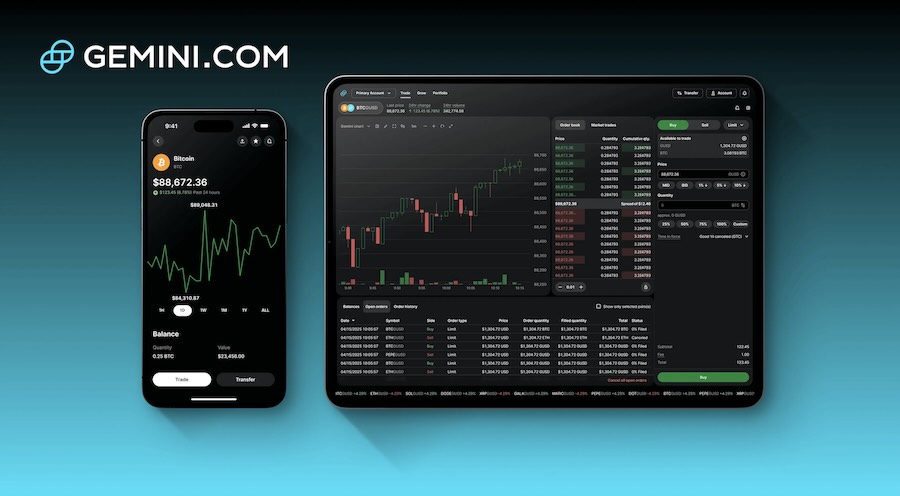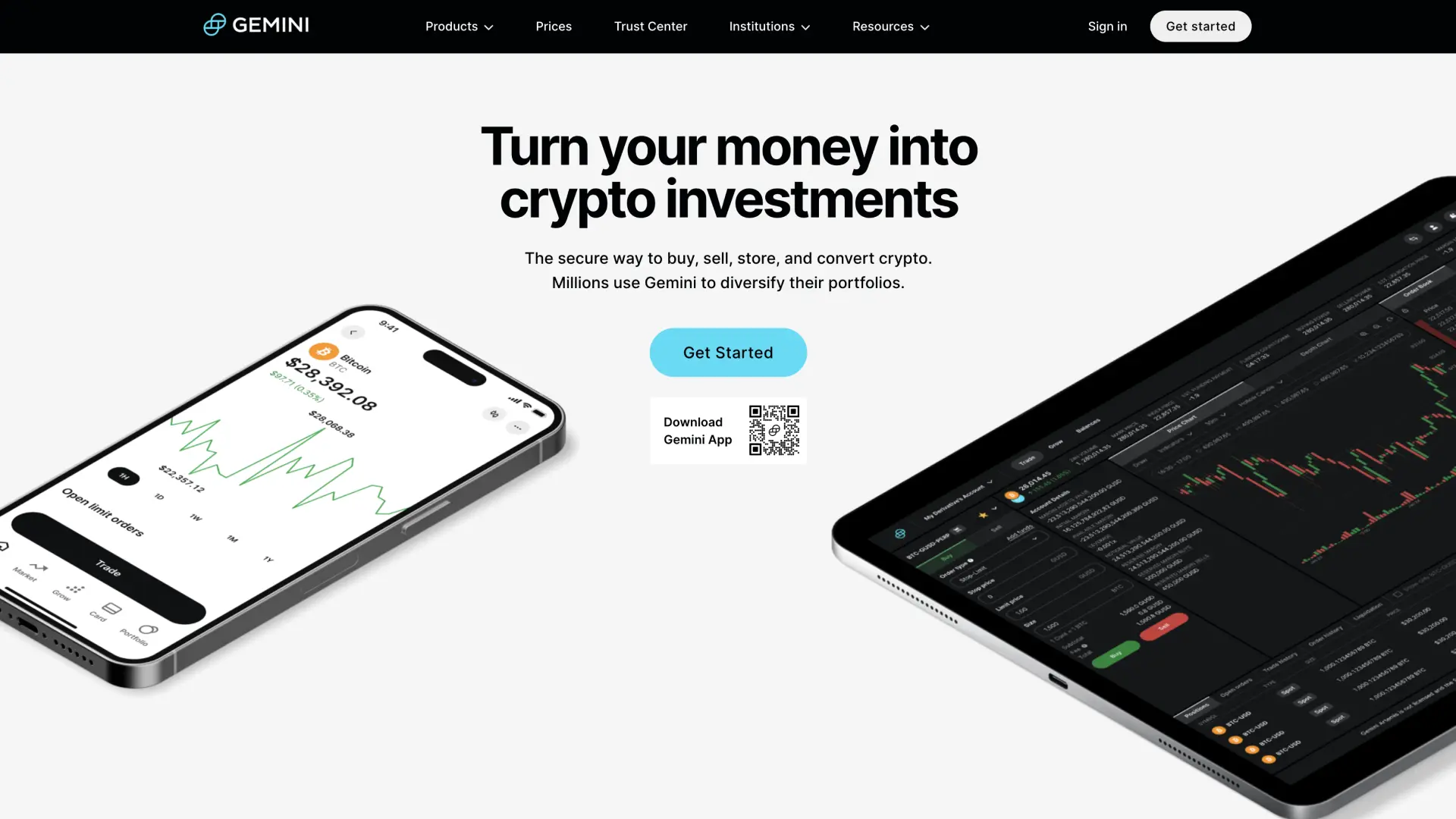*Disclaimer: The information provided here is for informational purposes only and does not constitute financial advice. Cryptocurrency trading involves risks, so please DYOR. For beginners, check out our Beginners Guides to learn more.

Gemini
Gemini: A US-Regulated Cryptocurrency Exchange Focused on Compliance and Security
Founded in 2014, Gemini is a New York–based cryptocurrency exchange operated by Gemini Trust Company, LLC. It positions itself as a secure, compliance-first platform for crypto trading and digital asset custody, serving retail users, active traders, and institutions across multiple jurisdictions. Gemini is known for its emphasis on regulatory oversight, audited security practices, and a conservative product set relative to more aggressive global exchanges. It offers spot trading, a professional interface for high-volume traders, derivatives in select regions outside the United States, and qualified custody services. Gemini also issues the Gemini Dollar (GUSD), a U.S. dollar–pegged stablecoin supervised by New York regulators.
Gemini’s value proposition centers on strong governance, transparent controls, and risk management. While it may list fewer tokens and offer fewer speculative features than some global platforms, its approach appeals to users prioritizing compliant access to digital assets over the most expansive altcoin or leverage offerings. With a U.S. trust charter and ongoing external audits, Gemini remains a notable choice for users seeking a security-forward exchange experience.
Core Services
-
Trading Platform:
- Spot Trading: Gemini supports 70+ cryptocurrencies in the U.S. and 100+ globally, with 100+ trading pairs across majors like Bitcoin and Ethereum and selective altcoins. Users can place market, limit, and stop-limit orders.
- ActiveTrader Interface: Designed for advanced users, ActiveTrader offers a full order book view, depth charts, integrated charting, and lower trading fees than Gemini’s default retail interface.
- Order Types and API: In addition to standard orders, Gemini provides REST and WebSocket APIs, FIX connectivity for institutions, and programmatic access for market data and order execution.
-
Derivatives (Availability Varies by Jurisdiction):
- Perpetual Futures for Non-U.S. Users: Gemini Derivatives offers perpetual contracts on select assets to eligible users outside the United States. Leverage limits are jurisdiction-specific, with risk controls and margin requirements applied per market rules.
- Risk Controls: Cross/isolated margin options, auto-deleveraging or insurance fund mechanisms (jurisdiction dependent), and maintenance margin monitoring across positions.
-
Custody and Wallets:
- Gemini Custody: Qualified, regulated custody with segregated cold storage, detailed account-level reporting, and institutional-grade access controls. Most customer assets are stored offline in geographically distributed, access-controlled facilities. This approach aligns with best practices for how to store crypto safely.
- Hot Wallet and Insurance: Gemini maintains an insured hot wallet program covering certain losses from security breaches. Coverage limits and terms are subject to change and exclusions.
- Transfer Options: On-chain deposits and withdrawals are supported for listed assets, with address whitelisting and withdrawal holds available for enhanced security.
-
Payments, Stablecoin, and Fiat On/Off-Ramps:
- Gemini Dollar (GUSD): A USD-pegged stablecoin governed by New York regulatory oversight. Reserves are held in a combination of regulated financial institutions and money market funds, with attestation reports published periodically.
- Fiat Funding: ACH, wire transfers, and debit options vary by region. In the U.S., ACH deposits typically clear quickly for trading availability, with settlement timing depending on bank networks.
- Internal Transfers: Fast transfers between Gemini accounts support seamless movement without on-chain fees.
-
Ecosystem and Additional Features:
- Gemini Credit Card (U.S.): Offers up to 3% back in crypto on dining, 2% on groceries, and 1% on other purchases. Rewards accrue in real time and can be redeemed into a supported asset.
- Staking (Jurisdiction-Dependent): Gemini has supported staking for select networks, but availability has changed over time and may be paused in certain regions, including the U.S., due to regulatory developments.
- Institutional Services: Dedicated account managers, tailored onboarding and compliance support, and custom connectivity for funds, treasuries, and trading firms.
- Education and Research: The "Cryptopedia" resource library and product support materials help users understand blockchain concepts, trading strategies, and platform features.

Security Measures
Gemini places a strong emphasis on security, implementing multiple layers of protection for user assets:
-
Account Security:
- Two-Factor Authentication (2FA): Strongly encouraged for all accounts, with support for time-based one-time passwords (TOTP) and hardware security keys (FIDO2/WebAuthn). This is essential for avoiding crypto scams and maintaining account security.
- Allowlisting and Controls: Withdrawal address allowlisting, device management, login notification emails, and session tracking provide layered protection.
- Role-Based Access for Institutions: Granular permissions and multi-user controls help segregate duties (trader, approver, viewer).
-
Platform and Custody Security:
- Cold Storage Majority: The majority of assets are stored in offline, geographically distributed cold storage under strict operational controls and limited access.
- Audits and Certifications: Gemini undergoes regular SOC 2 Type II audits of security and availability controls. It maintains formal security policies, vendor management programs, and incident response procedures.
- Insurance and Risk Management: Gemini maintains hot wallet insurance covering certain cybersecurity events, subject to policy limits and exclusions. Cold storage relies on operational security rather than insurance.
-
Incident History and Transparency:
- Third-Party Vendor Exposure (2022): Gemini reported that a vendor-related incident exposed some customer contact information (e.g., emails and partial phone numbers). No wallet systems were compromised, and the platform reinforced controls after the event.
- Earn Program Counterparty Default (2022–2024): Gemini’s “Earn” program was impacted when its lending partner halted withdrawals. Subsequent legal processes led to a recovery plan. Users should review Gemini’s latest statements for final recovery status and program availability.
-
Custodial Risk Disclaimer:
-
Assets held on Gemini are under Gemini’s custody or sub-custody arrangements and are not FDIC- or SIPC-insured. Users should evaluate self-custody options, understand hot-versus-cold storage differences, and diversify storage methods based on their risk tolerance.
-
Derivatives Risk Disclaimer:
-
Trading derivatives, especially with high leverage, carries extreme risk and can lead to rapid liquidation and total loss of collateral. These products are intended for experienced traders who understand margin mechanics, funding rates, and volatility risk.
-
User Experience
-
Interface and Accessibility:
- Retail App: A streamlined app for quick buys, recurring purchases, price alerts, and basic portfolio tracking. Suitable for crypto beginners and long-term allocators who prioritize simplicity.
- ActiveTrader: A professional interface with real-time depth, aggregated liquidity, and advanced order types, suited for market participants who require speed and visibility.
- APIs: Developer-friendly documentation, sandbox environments, and industrial connectivity options for algo traders and institutions.
-
Fees and Pricing Transparency:
- ActiveTrader Maker-Taker: Tiered fees based on 30-day volume; generally lower than the retail interface. Maker/taker rates vary by tier and asset; users should consult the live schedule.
- Retail Convenience Fee: Retail purchases may include a convenience or spread-like fee plus a transaction fee. While straightforward, this can be costlier than ActiveTrader for frequent trading.
- Deposits/Withdrawals: ACH is typically free; wires may incur bank fees. On-chain withdrawals reflect network costs and policy-based fees.
-
Support and Education:
- Help Center and Ticketing: Gemini offers guided help articles, email/ticket submission, and status updates for platform incidents or maintenance.
- Cryptopedia: A comprehensive knowledge base covering blockchain fundamentals, crypto trading strategies, wallet security, and market microstructure.
- Regional Support: Coverage hours and service options may vary by region and account type (retail vs. institutional).

Regulatory Compliance
Gemini has positioned itself as a compliance-focused exchange, actively seeking regulatory clarity and operating within established frameworks:
-
Licensing and Oversight:
- New York Trust Charter: Gemini Trust Company, LLC operates under a trust charter from the New York State Department of Financial Services (NYDFS), subjecting it to stringent capital, compliance, and consumer protection standards.
- Global Registrations: Outside the U.S., Gemini operates through regional entities, seeking registrations or exemptions as required. Status evolves by jurisdiction; users should verify local availability and permissions.
- Stablecoin Supervision: GUSD is issued under NYDFS oversight with reserve attestations, offering transparency into backing assets and controls.
-
Compliance Programs:
- KYC/AML: Identity verification, sanctions screening, transaction monitoring, and suspicious activity reporting are standard.
- Market Surveillance: Gemini employs surveillance tools to monitor trading behavior, detect market manipulation, and enforce fair access.
- Data Protection: Privacy policies, data minimization, and secure data handling aligned with applicable regulations (e.g., U.S. state privacy frameworks, GDPR for EU operations where applicable).
-
Regulatory Challenges and Litigation:
-
Earn Program Litigation: U.S. regulators and state authorities have taken actions related to the defunct “Earn” program. Court-supervised processes and settlements have unfolded over 2023–2024. Users should consult the latest official updates to understand final outcomes and any restitution measures.
-
Derivatives and Market Conduct: Gemini has faced inquiries and actions regarding aspects of its products and disclosures. These matters underscore the evolving regulatory environment for digital assets in the U.S.
-
Geographic Restrictions and Availability:
-
Services, asset listings, derivatives access, staking, and card products vary by country and, in the U.S., sometimes by state. Users must verify the legality and availability of Gemini in their location and ensure that product usage complies with local rules.
-
-
Regulatory Risk Disclaimer:
- Digital asset regulation continues to change rapidly. New rules can affect listings, staking programs, derivatives, stablecoins, and fiat rails, potentially impacting fees, access, and product continuity.
Points to Consider
-
Fees and Trading Venue Selection:
- If cost is a priority, compare the retail interface's convenience fee to ActiveTrader's tiered maker-taker pricing. Frequent traders typically benefit from ActiveTrader; casual buyers may accept higher costs for simplicity.
- Review the full fee schedule for your jurisdiction and trading volume; small changes in taker fees can meaningfully affect strategy profitability.
-
Asset Coverage and Listing Philosophy:
- Gemini lists fewer tokens than some global exchanges. If you require access to niche altcoins or high-yield products, assess whether Gemini’s curated approach fits your portfolio strategy.
-
Custody Versus Self-Custody:
- Understand the implications of leaving assets on an exchange. Consider using hardware wallets for long-term holdings and leaving only working capital on-platform for trading. Review Gemini's custody options if institutional-grade safekeeping is needed.
-
Derivatives and Leverage Discipline:
- If you trade derivatives (where available), define strict risk parameters: set maximum leverage, use stop-losses, size positions conservatively, and monitor funding rates. Only deploy capital you can afford to lose.
-
Regulatory and Counterparty Awareness:
- Keep abreast of product changes tied to regulatory updates, particularly for staking, lending, or yield products. Evaluate counterparty exposure in any program that rehypothecates or loans assets.
Conclusion
Gemini is a security-focused, compliance-oriented cryptocurrency exchange built for users who value regulated infrastructure and transparent controls. Its strengths include audited security practices, a professional trading interface, and predictable fiat on/off-ramps, complemented by a stablecoin issued under state oversight. The trade-offs are a smaller token catalog than some competitors and a conservative stance on high-risk features in certain markets—attributes that may limit opportunistic trading but reduce complexity and regulatory exposure.
For long-term allocators, high-net-worth users, and institutions seeking a regulated, security-first venue, Gemini is a strong candidate. Active traders can benefit from the lower-fee ActiveTrader interface and API connectivity, while global users outside the U.S. may access derivatives where permitted. As with any platform, remain mindful of custodial risk, evolving regulations, and the heightened risk of derivatives. Match the platform's strengths to your needs: use Gemini for compliant access to digital assets, professional trading tools, and secure custody—and complement it with self-custody and risk controls that align with your strategy.
Visit Exchange
Learn more about this cryptocurrency exchange platform
We may earn a commission at no extra cost to you. This is not financial advice. Cryptocurrency exchanges involve significant risks, including potential loss of all funds. Always verify the platform is legal in your jurisdiction and never invest more than you can afford to lose.
Explore other platforms on our Exchanges page or learn more about exchanges and brokers in general in our guide: Understanding Crypto Exchanges.

